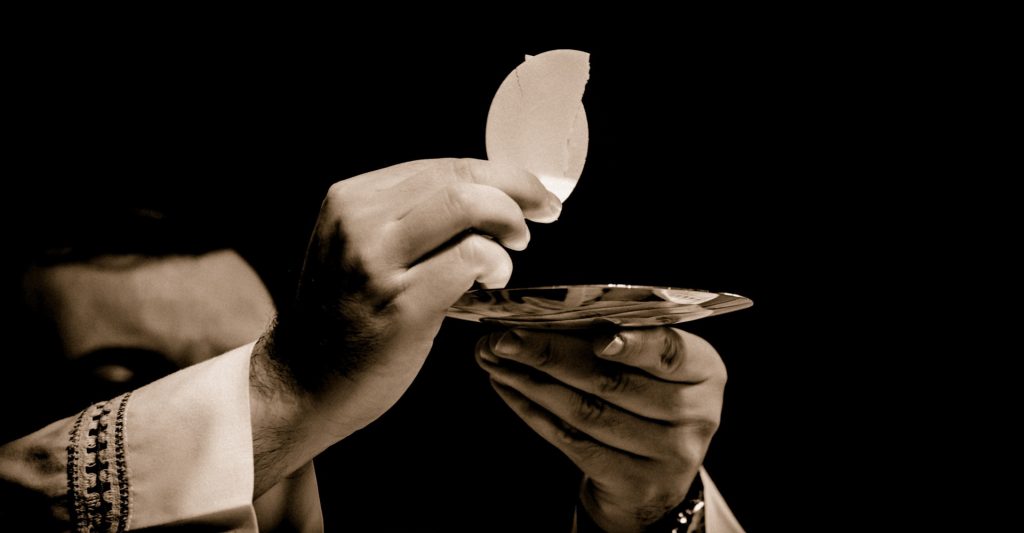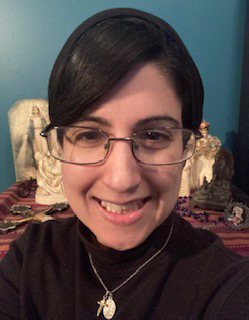
The Eucharistic Mystery is a gift to us that allows us to share in the Divinity of Christ and strengthens us to be His Light in the World.
By Christina M. Sorrentino
6 December 2020
During the month of November Pope Francis sent a letter commemorating the 500th anniversary of the first Mass in Chile to the Bishop of Punta Arenas, the diocese where the first celebration of the Eucharist took place. The Holy Father called for the faithful “to live the celebration of the Eucharistic Mystery, which unites us to Jesus, with a splendor of adoration and thanksgiving to the Lord, because it is for us the principle of new life and unity, which impels us to grow in fraternal service to the poorest and most disinherited of our society”. Pope Francis is not the first Pope to challenge us to live out the truth of our faith with a spirit of fidelity and deep conviction.
Divine Revelation and the Gift of Faith
How do we “live the celebration of the Eucharistic Mystery”? According to Pope Pius XI in his Encyclical, “Mysterium Fidei”, on the Holy Eucharist, we as Catholics, with great humility and reverence, must rely on Divine Revelation and not our own reasoning to believe in the “Real Presence”. It is by the gift of faith that we come to believe in the Mystery of the Faith. By listening to the words of Jesus repeatedly in the sixth chapter of John’s Gospel, the “Bread of Life Discourse”, “For My flesh is true food and My blood is true drink” and “Whoever eats my flesh and drinks my blood remains in me, and I in them,” (see verses 6:26 through 6:71) we hear Jesus speaking of both sacrifice and sacrament, the foreshadowing of the Institution of the Most Holy Eucharist.
Let us submit to God in all things and not contradict Him, even if what He says seems to contradict our reason and intellect; let His word prevail over our reason and intellect. Let us act in this way with regard to the Eucharistic mysteries, and not limit our attention just to what can be perceived by the senses, but instead hold fast to His words. For His word cannot deceive.
St. John Chrysostom, homily on Matthew
If we believe that Jesus Christ is the God-Man, the Second Person of the Trinity Who is the Son of God, then we know that He is the Truth. It is impossible for God to tell a lie, and the statement that Jesus makes while preaching on the Eucharist is not a symbolic one. If Jesus’ disciples thought that His words were mere symbolism, then why did many of His followers leave Him? They believed that He meant what He said really and truly and that is why they could not accept His words.
Christ’s Sacrifice Calls Us to Share Our Faith
During every single Catholic Mass we come to the Lord’s Table to receive His Body and His Blood. The Eucharist is the memorial of Christ’s sacrifice, the re-presentation of the same sacrifice that took place at Calvary (Catechism of the Catholic Church, no. 1366). After we partake in the Pascal Banquet we are called to share the fruits of the graces that we receive with the rest of humanity, especially the most neglected and spiritually abandoned souls. Our Pentecost moment, the dismissal at Mass, is when we are called to make present to the world the Pascal Mystery. As members of the lay faithful we have the duty to share our faith with others, and to serve the most vulnerable in our society: the unborn, our children, the aged and infirm, the migrant and refugee, those with disabilities, and those who are away from the faith.
In his encyclical, “Ecclesia de Eucharistia”, St. Pope John Paul II says “rekindle the Eucharistic amazement”, (no. 6) which will inspire us to have hope in our daily commitment to the work that lies ahead of us on our journey through this life. It is the Eucharist that marries Heaven and Earth. It is where we receive a taste of Paradise in this world, that which prepares us for life in eternity with the Triune God-head. The Second Vatican Council teaches us that it is this reality that makes more significant “our sense of responsibility for the world today” (Gaudium et Spes, no. 39).
St. Pope John Paul II speaks of the importance of not neglecting our duties as citizens of this world, one that lacks harmony and is filled with discord. How can we prepare our hearts to become citizens of the heavenly realm if we do not act first as citizens of this world? We have the obligation as Catholics to “think of the urgent need to work for peace, to base relationships between peoples on solid premises of justice and solidarity, and to defend human life from conception to its natural end” (Ecclesia de Eucharistia, no. 20).
To Reflect the Light of Christ, We Must Be United to the Eucharist
We must be the light of Christ in this world, which is only possible by uniting ourselves to Christ in the Eucharist. How can we offer to others that which we have not yet received ourselves? It is by receiving spiritual nourishment in the consuming of the Precious Body and Blood of our Lord Jesus Christ that enables our hearts to be set on fire with His infinite love.
Our entire lives should burn with endless devotion to our Eucharistic Lord if we truly know Who and What the Eucharist is to us. The Lord gave Himself to remain with the human race forever, so that we can be united with Him as to transform the world by the message of the Gospel. We become endowed with the courage and zeal necessary to work towards changing our own lives, and the lives of those whom we encounter.
It is by the mystery of the water and wine, the partaking in the “Supper of the Lamb”, that we receive a share in the Divinity of Christ, who humbled Himself to share in our humanity (Order of the Mass, no. 24). The love of Christ that enters into our very being when we receive the “Real Presence” in the Eucharist leads us to become more and more Christ-like in our thoughts, words and deeds, where we can then authentically “live the celebration of the Eucharistic Mystery”.
Read more about the Eucharist here.

Christina M. Sorrentino is a millennial, cradle Catholic who is a blogger and freelance writer in Staten Island, New York. She is a member of St. Joseph-St. Thomas, St. John Neumann Parish. She has volunteered as a catechist, and has been involved with youth and young adult ministry for the Archdiocese of New York. She earned a Masters in Education; Special Education Middle Childhood Generalist and later studied Theology at the Immaculate Conception Seminary School of Theology at Seton Hall University and Religious Education at Holy Apostles College and Seminary. Christina Marie is the published author of Called to Love A Listening Heart – A Book of Catholic Poetry, and has contributed articles and poetry to various online Catholic platforms. She is passionate about her Catholic faith, liturgy and the sacraments, praying for priests, and striving towards holiness. Her desire is to become a saint, and help bring souls to Christ in the Eucharist. You can visit her website at Called to Love – A Listening Heart, where she writes about the musings of a millennial Catholic called to love.
Leave a Reply